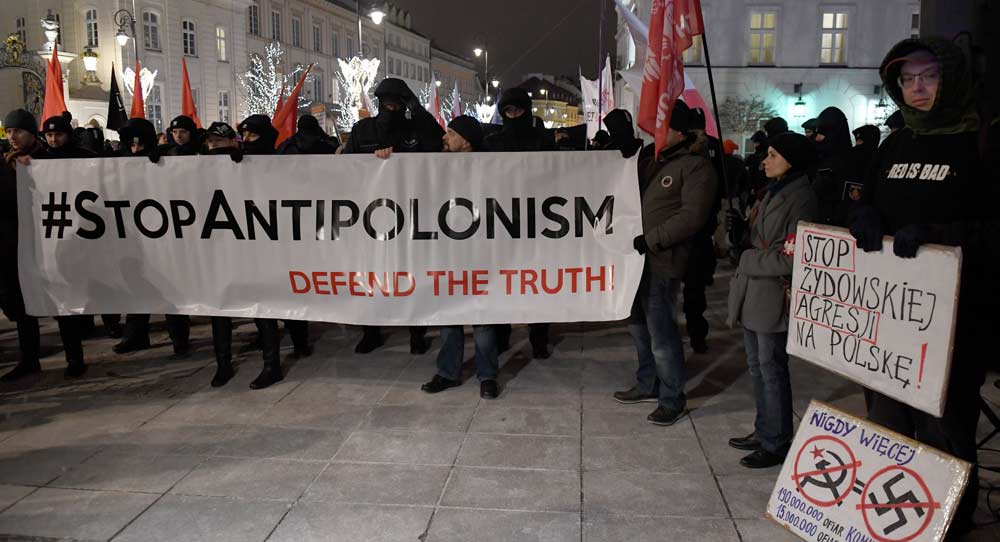Judy Dempsey
{
"authors": [
"Judy Dempsey"
],
"type": "commentary",
"blog": "Strategic Europe",
"centerAffiliationAll": "",
"centers": [
"Carnegie Endowment for International Peace",
"Carnegie Europe"
],
"collections": [
"EU Integration and Enlargement"
],
"englishNewsletterAll": "",
"nonEnglishNewsletterAll": "",
"primaryCenter": "Carnegie Europe",
"programAffiliation": "",
"programs": [],
"projects": [],
"regions": [
"Europe",
"Eastern Europe"
],
"topics": [
"EU",
"Democracy"
]
}
Source: Getty
Poland’s Narrative of Victimhood
Poland’s conservative government is squandering all the gains the country made since the overthrow of the communist regime in 1989.
A new draft law about the Holocaust, already passed by both houses of the Polish parliament and which President Andrzej Duda said he would sign, is jeopardizing the country’s relations with Israel, Jews around the world, the United States, and Ukraine.
In doing so, the governing Law and Justice party is squandering the great gains the country has achieved since 1989. It is turning its back on Poland’s post-communist period, during which a main political objective was to anchor the country in the Euro-Atlantic organizations of NATO and the EU. This goal was complemented by a narrative of rapprochement and reconciliation with Israel, Ukraine, and Germany, Poland’s important and most Western neighbor.
But now, because of this legislation, the Polish narrative is being rewritten in a way that it is becoming seeped in patriotism, victimhood, and revenge. This toxic combination has unleashed on social media an anti-Semitism reminiscent of the spring of 1968. That was when the ruling communist party launched a campaign against the country’s small Jewish community. Over 15,000 Polish Jews fled the country.
Polish governments and many Poles have protested or intervened for years when a journalist or a politician referred to “Polish death camps.”
But now, the new law states that “whoever accuses, publicly and against the facts, the Polish nation or the Polish state, of being responsible or complicit in the Nazi crimes committed by the Third German Reich…or other crimes against peace and humanity, or war crimes, or otherwise grossly diminishes the actual perpetrators thereof, shall be subject to a fine or a penalty of imprisonment of up to three years.” Any reference by journalists, politicians, or other individuals of “Polish death camps” will face fines or a prison sentence. The new law also allows criminal proceedings for “denying the crimes of Ukrainian nationalists.”
Artists and academics will be excluded but not journalists or individuals that do their own local research about the past. But even the former cannot be taken for granted.
The United States, Israel, and Ukraine have each reacted to this legislation. The State Department did not mince its words. A spokeswoman said the draft law could undermine free speech and academic discourse. But more importantly, if enacted, it would have “repercussions… on Poland’s strategic interests and relationships— including with the United States and Israel. The resulting divisions that may arise among out allies benefit only our rivals.” No guessing who Washington was referring to. Israel and Ukraine have sharply warned Poland against meddling with the truth and have asked Warsaw to abandon the proposed law.
The Polish government has shrugged off the criticism as if it does not understand the consequences. During a conference in Warsaw on February 5, Prime Minister Mateusz Morawiecki, implying victimhood, said over the past 25 years, Poland “has become a convenient whipping boy.”
On the contrary.
Over the past quarter of a century Poland won plaudits for its economic development and ambitious foreign policy. Soon after 1989, Warsaw embarked on a painful and difficult path of reconciliation with Ukraine. Both sides had to deal with the ethnic cleansing of Poles in western Ukraine and the ethnic cleansing of Ukrainians in south-eastern Poland that occurred during and after World War II. Going on the logic of the new legislation, any generalization of these Polish acts would be deemed a criminal offense. And decades of reconciliation in which Poland staunchly supported Ukraine’s integration with Europe would be seriously undermined.
Successive Polish governments also managed to build a close relationship with Israel, which was an immensely emotional and complex task given the degree of complicity by some Poles with the Nazi occupiers’ objectives of getting rid of the Jews. This was followed by the pogroms in Krakow in 1945, and in Kielce in 1946, and the anti-Semitic campaign in 1968. That relationship has now been very badly damaged.
In Israel, Yad Vashem, the World Holocaust Remembrance Center, runs a program called “The Righteous Among The Nations,” which recognizes the enormous risks that were taken to save Jews during the Holocaust. 6,700 Poles have already been honored, the biggest number in Europe. The Poles rightly point out that compared to many other countries, there were no Quislings in Poland. However, during the war, many Poles denounced Jews in hiding—and the Poles who sheltered them—to the Germans. Many also participated in the killing themselves. The attitude of the great majority toward the Jews ranged from indifference to hostility.
Poland’s foreign policy was also anchored on returning to Europe by joining the EU and NATO. Germany, in the meantime, embarked on its own reconciliation with Poland, which was based on apology and responsibility for the occupation of the country during World War II and the destruction of Europe’s largest Jewish community. In short, this foreign policy was linked to a very difficult assessment of Polish-Jewish relations, Polish-Ukrainian relations, and Polish-German relations. But Morawiecki’s statement reflects a narrative that Law and Justice is propagating: that Poles were and continue to be victims. If Poles were victims then the issue of guilt, responsibility, and truth run up against each.
“This crisis is about the TRUTH. The truth about what happened seventy years ago and the facts which are still disputable,” wrote Andrzej Rojek, chairman of the Jan Karski Educational Foundation based in New York. “There would be no concept of ‘political history’ if the facts were established beyond reasonable doubt.” For Rojek, “it is a bad game to let politicians play with historical facts.”
Morawiecki, however, stated that “finding the truth is in our national interest.” But who defines the national interest when it comes to dealing with the past? Prosecutors and judges, according to this new law.
Jarosław Kaczyński, the leader of Law and Justice, is intent on imposing a specific nationalist agenda on interpreting the past. It’s not just about what happened during World War II and its immediate aftermath. It is about what happened after 1989.
Even though Kaczyński and many other Law and Justice activists were part of the anti-communist Solidarity movement, Kaczyński holds onto the belief that the liberal intellectuals of Solidarity did not complete the transformation of Poland after 1989 because they did not “de-communize” the system. And because they sought reconciliation at home and with Ukraine, Germany, and Israel, the narrative of patriotism and nationalism was marginalized. Law and Justice is now seeking to control the new narrative—ironically, just as the communists tried to do.
It’s hard to see Law and Justice backing away from the law. Duda, disingenuously, said he would send it to the Constitutional Tribunal because of the many objections. But isn’t the Constitutional Tribunal controlled by Law and Justice as part of the so-called reform of the judiciary? In the meantime, the governing party faces three big elections in the coming year—local, national, and in the European Parliament. Its popularity, at 47 percent, is at an all-time high as its nationalist and patriotic narrative gains traction, particularly among young voters. At the least, such a narrative brings with it a loss of influence among its very close allies—which Russia will surely welcome. At the most, it undoes everything Poland had striven for after 1989.
About the Author

Nonresident Senior Fellow, Carnegie Europe
Dempsey is a nonresident senior fellow at Carnegie Europe
- Europe Needs to Hear What America is SayingCommentary
- Babiš’s Victory in Czechia Is Not a Turning Point for European PopulistsCommentary
Judy Dempsey
Recent Work
Carnegie does not take institutional positions on public policy issues; the views represented herein are those of the author(s) and do not necessarily reflect the views of Carnegie, its staff, or its trustees.
More Work from Strategic Europe
- Europe on Iran: Gone with the WindCommentary
Europe’s reaction to the war in Iran has been disunited and meek, a far cry from its previously leading role in diplomacy with Tehran. To avoid being condemned to the sidelines while escalation continues, Brussels needs to stand up for international law.
Pierre Vimont
- Taking the Pulse: Can European Defense Survive the Death of FCAS?Commentary
France and Germany’s failure to agree on the Future Combat Air System (FCAS) raises questions about European defense. Amid industrial rivalries and competing strategic cultures, what does the future of European military industrial projects look like?
Rym Momtaz, ed.
- Macron Makes France a Great Middle PowerCommentary
France has stopped clinging to notions of being a great power and is embracing the middle power moment. But Emmanuel Macron has his work cut out if he is to secure his country’s global standing before his term in office ends.
Rym Momtaz
- How Europe Can Survive the AI Labor TransitionCommentary
Integrating AI into the workplace will increase job insecurity, fundamentally reshaping labor markets. To anticipate and manage this transition, the EU must build public trust, provide training infrastructures, and establish social protections.
Amanda Coakley
- Can Europe Still Matter in Syria?Commentary
Europe’s interests in Syria extend beyond migration management, yet the EU trails behind other players in the country’s post-Assad reconstruction. To boost its influence in Damascus, the union must upgrade its commitment to ensuring regional stability.
Bianka Speidl, Hanga Horváth-Sántha










